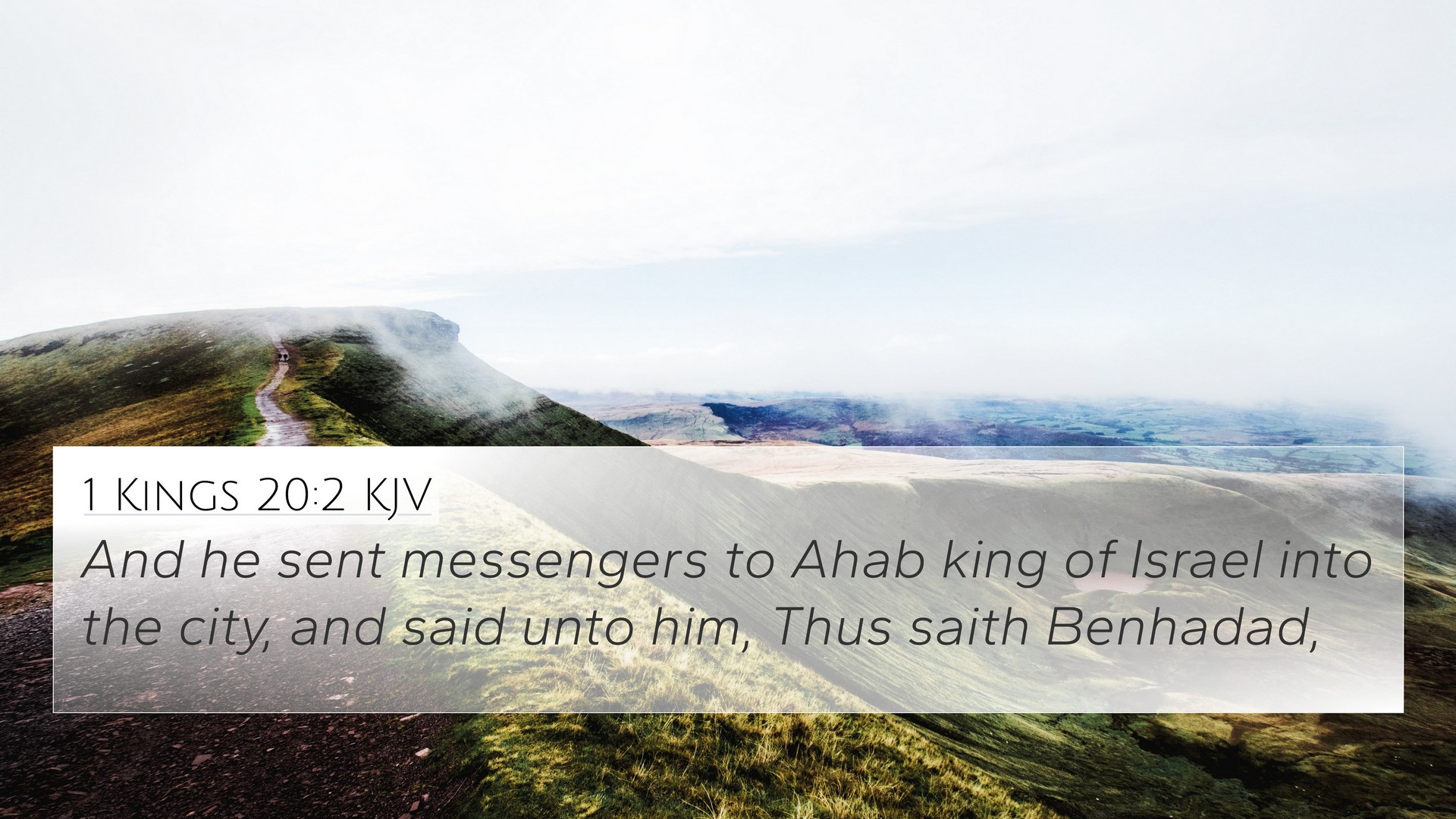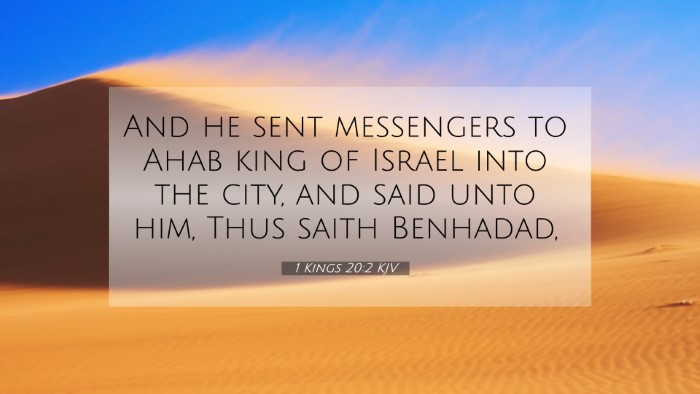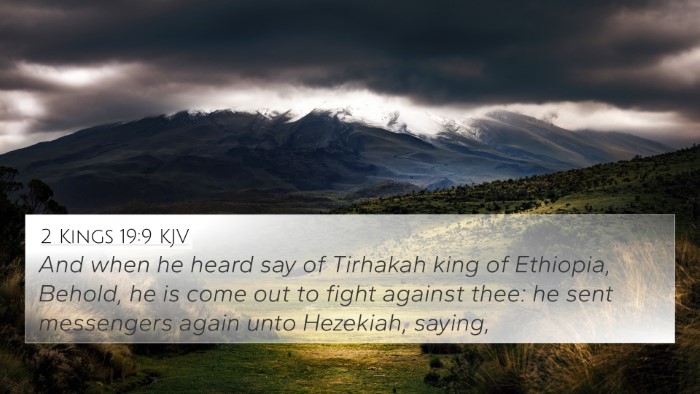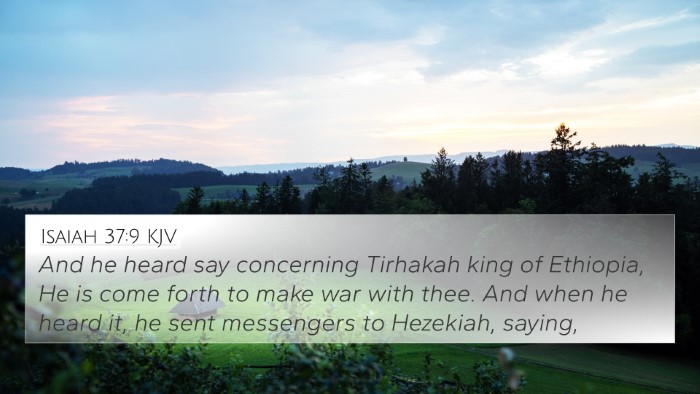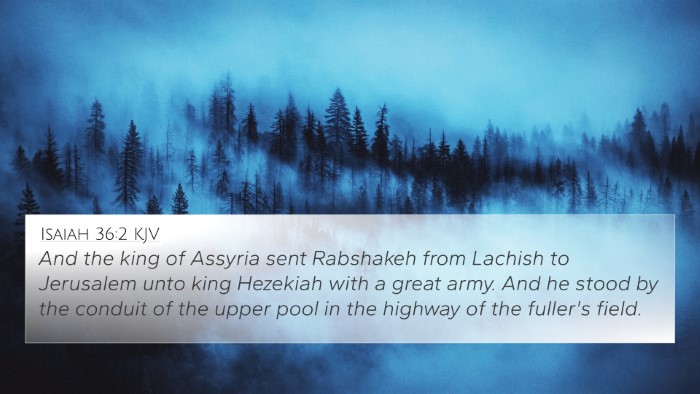Understanding 1 Kings 20:2
Bible Verse: 1 Kings 20:2 - "And he sent messengers to Ahab king of Israel into the city, and said unto him, Thus saith Benhadad."
Summary of the Verse
This verse introduces Benhadad, the king of Syria, as he sends a message to Ahab, the king of Israel. This moment sets the stage for a pivotal conflict between these two leaders. Benhadad, representing a foreign power, communicates with Ahab, indicating a challenge to Israel's sovereignty and signaling impending warfare. The act of sending messengers denotes a formal declaration, which is crucial for understanding the nature of ancient diplomacy.
Exegesis from Commentaries
Matthew Henry's Commentary: Henry highlights the significance of communication in this historical context. He notes that the messages symbolize the authority Benhadad wielded and his ambition to dominate Israel. Benhadad's challenge showcases the ongoing tensions and conflicts Israel faced from neighboring nations. Henry also reflects on God’s sovereignty underpinning these events, suggesting that such conflicts are ultimately under Divine control.
Albert Barnes' Notes: Barnes elaborates on the implications of this correspondence. He points out that Ahab’s response and subsequent actions are crucial in determining Israel's fate. Barnes stresses the importance of leadership decisions in times of crisis. This verse foreshadows Ahab's character and sets the tone for his divinely influenced yet problematic decisions throughout his reign.
Adam Clarke's Commentary: Clarke emphasizes the character of Benhadad himself. He posits that this message reflects Benhadad's arrogance and belief in his own power. Clarke also brings attention to the larger geopolitical context, revealing the fraught relations between Israel and its neighbors, which are essential for understanding the narrative's development in the Book of Kings.
Key Themes and Lessons
- Authority and Power: This verse illustrates the authority of kings and the serious nature of requests made during times of conflict.
- Divine Sovereignty: Although political leaders appear to have control, the overarching providence of God is always at play.
- Communication in Leadership: The methods of interaction between nations highlight the importance of diplomacy and communication in conflict resolution.
Bible Cross-References
Several other biblical verses relate closely to 1 Kings 20:2, offering deeper insights into the themes and events surrounding this narrative. Here are 10 relevant cross-references:
- 1 Kings 18:17-18 - The confrontation between Elijah and Ahab about the worship of Baal.
- 2 Chronicles 18:1-3 - Ahab’s alliances with foreign nations and the consequences of these actions.
- Isaiah 7:1-2 - The geopolitical struggles impacting Israel during the time of Ahab.
- 1 Kings 21:25 - Ahab's wickedness and how it relates to God’s judgment.
- 2 Kings 8:7-9 - The continuing conflict between Israel and Syria during the prophetic reign.
- Amos 1:3-5 - Prophecies regarding the enemies of Israel, including Syria.
- Micah 1:5 - The consequences of Israel's sins and the invaders they would face.
- Proverbs 21:30 - The futility of schemes against the Lord, highlighting the divine control over nations.
- Romans 13:1-2 - The principle of governing authorities being ordained by God.
- Hello, Joshua 1:9 - The encouragement that God provides to leaders amid conflict.
Thematic Connections and Reflections
When studying 1 Kings 20:2 utilizing various scriptures, one can see a clear thematic connection between power dynamics, foreign relations, and the sovereignty of God. The interactions among kings throughout the Bible reflect a pattern where human ambition often clashes with divine intentions.
By comparing this verse with those that follow in Kings and other prophetic writings, scholars and students can better appreciate the historical and spiritual implications of these events. Understanding these cross-references allows for a richer exploration of the scripture, leading to stronger doctrinal conclusions and practical applications in faith.
Conclusion
1 Kings 20:2 serves as a crucial point in the narrative of Israel's history, revealing the complexities of leadership, the importance of communication, and God's providential oversight in the affairs of nations. By engaging with cross-referential scriptures, one can gain a more holistic and profound understanding of both this verse and the broader biblical narrative.
